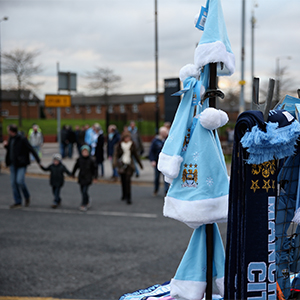The Premier League is 25 years old on 15 August 2017.
To mark the anniversary, BBC Sport has produced five pieces, each covering a five-year period in the competition's history.
This is the fourth piece, focusing on the span from 2007-08 to the end of the 2011-12 campaign.
Scroll down for written insight, a visual timeline, Mark Lawrenson's team of the era, a tailored tactics board and tables, before testing yourself with our Merlin sticker quiz.
Fifteen years into its existence, life appeared to be accelerating for the Premier League: more money from more television deals; bigger stadiums and a vastly larger global audience; club owners showing less patience with their managers, supporters showing less patience with their club’s owners.
A year after winning consecutive titles with Chelsea, a few months after beating Manchester United in the FA Cup final, Jose Mourinho was gone from Stamford Bridge. His rehabilitation would not take long; at Inter Milan, he would win both Serie A and the Champions League. The club he left behind would get through another three managers in two years before finding their own way back to the title.
This was an era when, having conquered the sport’s commercial markets, Premier League teams would go tilting at the continent’s big trophies too. A run of seven years out of eight with an English team in the final of the Champions League included the appearance of both champions (Manchester United) and runners-up (Chelsea) in the final of 2008, John Terry’s penalty slip giving United their second European Cup under Alex Ferguson. Barcelona’s peerless tiki-taka would deny them two more over the next three years.
The balance of power could change quickly. On the last day of the 2007-08 season, Manchester City lost 8-1 at Middlesbrough. On 1 September, taken over by the Abu Dhabi Group, they were instantly the richest club in England. The noisy neighbours had arrived, flaunting their wealth with the £32.4m signing of Robinho and a billboard featuring former United star Carlos Tevez and the slogan ‘Welcome to Manchester’ on the city centre’s Deansgate. Rolando Bianchi and Gelson Fernandes would not be long for the Etihad.

As a sign of the way the future fortunes of the respective sides, Manchester City beat Portsmouth 6-0 on 21 September 2008
With the wealth of the big boys at the top of the table it was a contest between the haves and the have mores. Elsewhere the football and the finances were not adding up in the same happy way. Portsmouth, big spenders, FA Cup winners, went into administration in 2010 with debts of £60m and would fall all the way to League Two. Derby were relegated in 2008 with a record low of 11 points.
While Ferguson fought on at United, seemingly reinvigorated by City’s fresh challenge, the other old stagers lost their touch and began to be moved on. Sven-Goran Eriksson, supposedly lined up as Ferguson’s successor when retirement had been mooted a few years before, instead came in at City and was then usurped himself by the younger charms of Mark Hughes and then Roberto Mancini. Kevin Keegan’s second spell at Newcastle ended just the way all had feared. Paul Ince, Roy Keane and Tony Adams, all playing stars of the Premier League’s first burst, found managerial posts harder to hang on to.
You couldn’t fault the entertainment. Before disappearing down the leagues, Portsmouth beat Reading 7-4. Sunderland beat Liverpool with the help of a beach ball and a confused referee.
When Chelsea, having experimented with Avram Grant, Luiz Felipe Scolari and Guus Hiddink, finally settled on Carlo Ancelotti, they won the Double in 2010 by scoring a record-breaking average of 2.71 goals a game. Didier Drogba powered in 29, Frank Lampard contributing 22 from midfield on his way to becoming the club’s all-time top scorer. His team scored seven or more goals in four Premier League matches.
Clearly in need of goals, they then spent £50m to bring Fernando Torres from Liverpool, just as the Spanish striker went from unstoppable to unrecognisable. Flush with funds, Liverpool then spent 50% more on Andy Carroll than they had on Luis Suarez earlier on the same day.
Neither Torres nor Carroll would score for three months, which was one of the reasons Ancelotti found himself sacked having taken Chelsea to first and second place in his only two seasons there. He also left with the third best win-loss record in the league’s history, a one-two-three made easier to bear by the £6m severance payment he received. More money, less patience.
Totems kept toppling. Newcastle United were the next great old club to be relegated – just months before the football world mourned the loss of their former manager and servant of England Sir Bobby Robson. Technology kept moving the game along, match reports being challenged by live text commentaries and then social media, even if not everything stuck - 3D filming arrived on Sky to a fanfare and slipped away to shrug.
When Ferguson’s United won their 19th top-flight title in 2011 to surpass the mark of their traditional rivals Liverpool, their hegemony seemed safe. Liverpool had lost patience with their own Champions League winner Rafa Benitez. Chelsea kept hiring and firing, Andre Villas-Boas succeeding Ancelotti, Roberto di Matteo succeeding in Europe and then getting the heave-ho too.

Chelsea's bosses between 2007-08 and 2011-12: (Right to left) Jose Mourinho, Avram Grant, Luiz Felipe Scolari, Guus Hiddink, Carlo Ancelotti, Andre Villas-Boas and Roberto di Matteo
How rapidly it changed. In October 2011 United lost 6-1 at home to a rampant City. Losing again to Mancini’s men as the season reached its climax, this time by the far narrower margin of 1-0 but with just as much impact, they were still champions elect with 92 minutes gone on the season’s final day.
Then came Edin Dzeko, and then came Sergio Aguero. In three added-on minutes, Premier League supremacy had shifted again. Everything in higher definition, everything speeding up.

20 September 2007: Jose Mourinho, who had guided Chelsea to two Premier League titles, two League Cups and an FA Cup triumph in three years, shocks football and resigns as manager after falling out with the club’s billionaire owner Roman Abramovich.

29 September 2007: Eleven goals, two of them scored by players into their own net and one of them a penalty, and a hat-trick for striker Benjani Mwaruwari. There would have been more but for David James saving Nicky Shorey’s penalty. Portsmouth 7-4 Reading remains the highest-scoring Premier League game.

29 March 2008: Derby County's relegation is confirmed when they can only manage a 2-2 draw at home to fellow Premier League strugglers Fulham - the earliest relegation to be confirmed in all 25 seasons of the Premier League to date. They finish the season on 11 points - a record low.

1 September 2008: Manchester City are taken over by the Abu Dhabi United Group to become the richest club in England overnight and change the Premier League landscape. They cap the most exciting of transfer deadline days by paying a record £32.4m for Real Madrid and Brazil striker Robinho.

1 July 2009: After helping Manchester United win a hat-trick of Premier League titles and the Champions League between 2006 and 2009, scoring 118 in 292 appearances, Cristiano Ronaldo moves to Real Madrid for a world record fee of £80m.

26 December 2008: With his team 4-0 down, Hull manager Phil Brown decides to give his half-time team-talk to his players on the pitch at Manchester City. Hull end up losing 5-1. The following season, Hull midfielder Jimmy Bullard replicates the team-talk as a celebration after scoring to earn a 1-1 draw at the Etihad Stadium.

18 July 2009: Manchester City taunt rivals United with a city-centre billboard “welcoming” Carlos Tevez to the city after he signs for them following his rejection of the chance to extend his two-year stay at Old Trafford.
17 October 2009: The strangest assist in Premier League history. Sunderland beat Liverpool 1-0 at the Stadium of Light after Darren Bent's shot is deflected in to the net off a beachball that had been thrown on by a fan. The goal should have been ruled out and a drop ball awarded. Liverpool boss Rafael Benitez leaves the club at the end of the season.

26 February 2010: After running up debts of £60m, Portsmouth go into administration - the first Premier League club to do so. Pompey are deducted nine points and are relegated to the Championship. Their decline continued with the club descending into League Two in 2013.

31 January 2011: A manic transfer deadline day. Chelsea pay a British record £50m for Liverpool striker Fernando Torres while the Reds pay £35m for Newcastle's Andy Carroll - breaking the transfer record for a British footballer. Neither player scores for their new clubs until April.

12 February 2011: Wayne Rooney scores a stunning overhead kick in a 2-1 home win over Manchester City - a goal voted as the best in the opening 20 years of the Premier League. Striker Rooney finishes the season with 16 goals as United claim their 12th Premier League title.

28 August 2011: An under-strength Arsenal are humiliated at Old Trafford as Manchester United beat them 8-2, with Wayne Rooney scoring a hat-trick.

23 October 2011: Manchester City inflict Manchester United's worst home defeat since February 1955 as they thrash the champions 6-1 in ruthless fashion to go five points clear at the top of the Premier League.
13 May 2012: Manchester City score twice in stoppage time to be crowned champions for the first time in 44 years as they beat Queens Park Rangers to win the Premier League on goal difference from Manchester United. United are set to become champions until first Edin Dzeko equalises in the second of five minutes of stoppage time before Sergio Aguero scores the goal that wins the title.

























